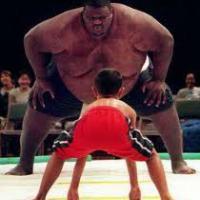
How to Beat a Much Stronger Opponent
Most chess players face this problem pretty frequently: what should I do against a much stronger opponent? And here when we say "a much stronger opponent" , we talk about somebody who is at least 300-400 rating points higher. Let's start from major mistakes in this situation.
1) Trying to trade pieces naively thinking that every trade would make a desirable draw closer. I've seen it many times when in the first round of a Swiss tournament I played a lower-rated opponent. I have to confess, nothing makes me more happy than seeing my opponents trying to desperately simplify a position, giving me concession after concession with every single trade. Such players probably don't realize that Grandmasters usually know a thing or two about endgames, so going for an inferior endgame just because there are fewer pieces on the board is a truly lousy strategy, believe me!
2) The second most popular awful strategy is to play some dubious sideline trying to surprise your higher-rated opponent. The reasoning (equally naive and wrong) goes like this: my higher-rated opponent mostly plays chess players of approximately the same level who never play this wonderful line popular in our club so he won't be prepared as well as I am. I addressed this faulty thinking in this article already (http://www.chess.com/article/view/cute-little-beasts-part-four) so let me just use again a very instructive quote of GM Alex Yermolinsky from his excellent book "The Road to Chess Improvement".
"I will reveal a little secret: there is nothing I want more from my opponent than to step away from main-line theory. Go ahead, surprise me, throw me off balance, make me think on my own- any way you call it- but there is a catch. You give me a good position after the first 10 moves with plenty of pieces on the board, and I'll find a way to outplay anybody 300 rating points below me."
So, what is the correct strategy then? Do the opposite! (I talked about the way to apply this George Costanza principle here: http://www.chess.com/article/view/do-the-opposite). You play the sharpest chess you can and you play the best openings you know. The reason is simple. If you get some positional advantage and the game goes on and on, your higher-rated opponent will be able to use his great chess skills to gradually outplay you in a long game. However, if you manage to achieve a strong attack, then one good strike can just crash him and the game would be over right away.
I discussed this strategy already in this article: http://www.chess.com/article/view/openings-for-tactical-players-how-to-beat-a-grandmaster and today want to provide a real life example from a game of one of my students.
So, it is a major open tournament (Foxwoods Open) and my student Jason Duncan (USCF 2189, FIDE rating 2161) is playing one of the strongest US players GM Yuri Shulman (USCF 2649, FIDE rating 2576). As you can see the rating difference is over 400 point in both USCF and FIDE ratings, but Jason didn't panic and just tried to play the best chess he could. For starters he played the King's Indian Attack which we were discussing the last couple of weeks. This is a sideline compared to the main lines of the Sicilian, but definitely not one of the dubious 'surprise' openings I was talking about above. Besides, during our lessons we analyzed many Fischer games and so Jason knew that White's attack can be very serious there and the Black King can get checkmated there regardless of the strength of a player. Now, let's see the game.
I give you a chance to test your attacking skills and see how you would play in the same situation against a much stronger opponent, therefore the game is given as a Quiz. Please remember that you can always replay the whole game from the first move if you click "Solution" and then "Move list".)
What would you play in the position in the diagram? Want a clue? Read this article hocus-pocus-part-three !







